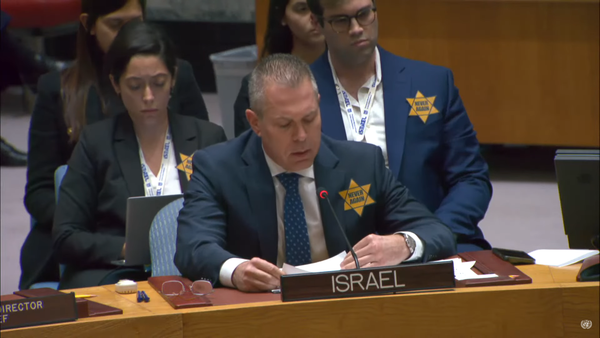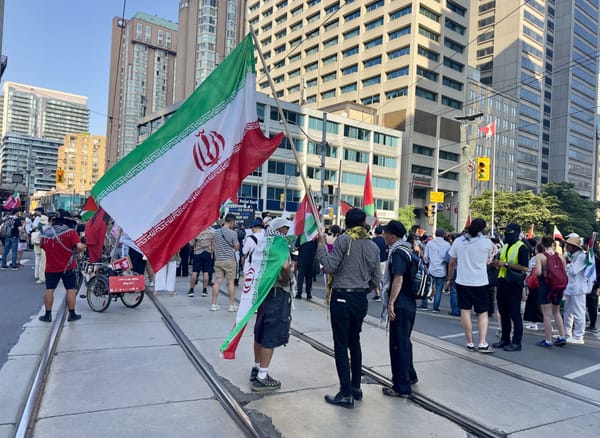Yesterday, The Globe and Mail published an article by former Supreme Court justice Rosalie Abella arguing that South Africa’s application to institute proceedings against Israel at the International Court of Justice (ICJ) for genocide is “shameful.” Someone as well-accomplished as Abella should be ashamed to have her name on this article.
Naturally, you’ll wonder what I, a “journalist” to friends and a “blogger” (at best) to enemies, with no hint of a law degree in either case, am doing arguing on a point of law with a former jurist such as Abella. It’s a good question, but there’s a simple answer: Abella’s article almost completely avoids any discussion of the legal issues or facts at hand, and makes a vibes-based case instead — something I feel qualified to refute.
I’ve quoted segments (making up the majority) of Abella’s article in bold below, and responded to each one.
“To me, this case represents an outrageous and cynical abuse of the principles underlying the international legal order that was set up after the Second World War.”
South Africa’s 84-page document explains why the ICJ is the right body for its case. The application notes: 1) it and Israel are United Nations (est. 1945) members and parties to the Genocide Convention (est. 1948); 2) neither have expressed reservation to Article IX of the Genocide Convention, which calls for disputes on matters of genocide between parties to be brought to the ICJ; 3) any party to the Genocide Convention can bring forward a case against another party; 4) as a party to the Genocide Convention, it has an obligation to prevent genocide.
South Africa has made the case that it’s following the rules of the bodies created after the Second World War that both it and Israel agreed to. Abella doesn’t dispute any of this legally. Instead, she implies that South Africa doesn’t have legitimate cause to bring forward this case because nine years ago it failed to arrest the leader of a different nation at the behest of a different court. In other words: irrelevant on a legal basis.
“It is a legal absurdity to suggest that a country [Israel] that is defending itself from genocide [from Hamas] is thereby guilty of genocide.”
South Africa’s application makes a detailed case that Israel is in the process of committing genocide, relying on a variety of sources with a document that contains more than 570 footnotes. It also references many UN bodies and experts that, since mid-October onward, have at minimum expressed concern Israel is committing genocide: 30+ UN Special Rapporteurs; 28+ members of UN Working Groups; the UN Committee on the Elimination of Racial Discrimination; the Director of the New York Office of the High Commissioner of Human Rights; the UN Special Rapporteur on violence against women and girls.
Abella’s argument for her claim that Hamas is perpetrating genocide is that it has supposedly killed Jewish people “because they were Jews.” This is a false assertion on its own, given that Hamas and other Palestinian resistance factions oppose Israel because it is an occupying entity, not because the majority of its citizens are Jewish. Even if true, Abella offers no examples of any scholars, organizations or legal bodies who have concluded that Hamas’s actions on October 7 were genocidal — not just bad, illegal, or even war crimes, but genocidal.
And to go even further, even if that were true, Abella doesn’t cite the part of the Genocide Convention where it says it’s totally cool to commit a genocide if you think someone is trying to make you the victim of one. As South Africa’s application notes, “States parties to the Genocide Convention have ‘expressly confirmed their willingness to consider genocide as a crime under international law which they must prevent and punish independently of the context “of peace” or “of war” in which it takes place.’”
Of course, Abella’s assertion that what Israel is doing in Gaza is merely limited to “defending itself” is debunked in the bulk of South Africa’s report, which argues it has committed at least seven genocidal acts, including: killing Palestinians in large numbers; inflicting conditions of life on Palestinians intended to bring about their destruction as a group; expelling Palestinians from their homes and destroying their residential areas; depriving Palestinians of adequate food, water, medical care, shelter, hygiene, sanitation; destroying Palestinian society; preventing Palestinian births.
“We find ourselves in the perverse situation where a genocidal organization such as Hamas is able to escape legal scrutiny or sanction for committing genocidal acts, while the country that is the intended target of its genocidal intentions is being called upon by the International Court of Justice to defend itself from allegations of genocide.”
The idea that Hamas will escape legal scrutiny or sanction, or has done so in the past, is absurd. The International Criminal Court (ICC) is already investigating Hamas’s actions on October 7, and South Africa’s application mentions the ICC Prosecutor has stated hostage-taking “represents a grave breach to the Geneva Conventions.” Hamas, of course, has also been designated in its entirety as a terrorist organization by six countries (including Canada in 2002) and the whole European Union, meaning that it, as well as those suspected of supporting it abroad, face sanction and legal punishment — unlike the supporters of Israel’s genocidal violence.
I also suspect that any government on the planet would prefer to be in Israel’s situation (facing a legal challenge that may end up meaning little against you in practice even if successful) to that faced by Hamas (the destruction of the land you govern and the people you’re responsible for representing). Hamas has faced far worse consequences than Israel in every way, despite Israel objectively having caused more death and destruction, both now and in the entirety of the existence of Hamas.
“This is an insult to what genocide means, an insult to the perception of the ability of international courts to retain their legitimacy and transcend global politics, and an insult to the memory of all of those on whose behalf the Genocide Convention was created.”
International bodies like the ICJ have been criticized for being undermined by, for example, U.S. dominance preventing it or its allies from facing the punishment that countries in the Global South do. For much of the world, the ICJ taking this application against Israel seriously would likely improve its perception and legitimacy, not undermine it. This is not relevant to the merits of the case, though, nor is Abella’s interpretation.
“History will judge Israel’s response to Hamas’s genocidal attack on Oct. 7 and determine whether the retaliatory measures it took to protect its security were conducted in accordance with the law. That is a legal question that will necessarily balance purpose, cause, effect and context. [...] There will inevitably be accountability – if only the world showed the same obsessive interest in holding other countries to legal account.”
Why have a legal system if “history” can do a good enough job judging people, I guess? This is a bizarre statement from someone who has spent the majority of their life in the legal field, including at the highest possible level in Canada as a Supreme Court judge. The matter before the ICJ is a “legal question” that it is in a place to judge. There is no need to wait for “history.”
South Africa is asking the ICJ to rule that Israel must: stop any actions that breach its obligations under the Genocide Convention; ensure those responsible for these breaches are punished at a national or international level; collect and conserve evidence of the genocide; make reparations to Palestinians; and assure the court and world it won’t do it again. “History,” meanwhile, is not capable of making rulings that can be enforced at an international level in the way that the ICJ, theoretically, at least, can.
Abella’s implication that the real reason Israel is being brought before the ICJ is antisemitism is shameful, especially given that there’s a case against Russia currently at the ICJ on the same charges, but with the support, thus far, of more countries in the world.
“The unbearable tragedy of war lies in the deaths and suffering of innocent civilians, and there can be no doubt that the deaths and suffering of thousands of civilians in Gaza is an unbearable tragedy. That is why the international community developed a sophisticated set of legal instruments after the Second World War: to prevent, minimize, and sanction global conflicts.”
This is an argument for the ICJ hearing South Africa’s application, not against it.
“Seventy-five years after the birth of the Genocide Convention and of the state of Israel, both of which rose from the ashes of Auschwitz, we find genocide and rape and torture in full and flagrant flight in too many parts of the world. Yet the country that finds itself as the designated avatar of genocide is Israel.”
Again, this is all irrelevant to the merits of the case. “Genocide and rape and torture” occurring outside of Gaza does not justify it within Gaza, and any of the state parties to the Genocide Convention (including Israel) are capable of bringing a case against another party if they believe they are guilty of such acts.
Israel is not the only country being accused of genocide before the ICJ, but, as South Africa’s request for provisional measures to be implemented notes, the brutality and ongoing nature of its actions demands the utmost urgency from international bodies.
It’s also worth noting that the West collectively has provided another alleged victim of genocide at the ICJ with billions of dollars in weapons and other ways to support itself. Gaza has had no such luck.
“As a lawyer, I find it shameful; as a Jew, I find it heartbreaking; and as the child of Holocaust survivors, I find it unconscionable.”
An esteemed legal figure is setting aside the law for an article based on identity politics, as if her status as a Jewish person or a child of Holocaust survivors is relevant to the merits of the case.
What Abella’s article shows, and what has become so apparent given the support for the genocide in large segments of Israeli society and parts of Jewish communities abroad, is that being the descendants of genocide survivors unfortunately does not guarantee you’ll be opposed to future ones. “Never again,” to a disturbing number of people, seems to mean, “Never again, to us.”
I look forward to seeing South Africa’s application debated on its legal merits.







